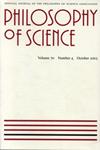社会动态和学科的演变
IF 1.4
2区 哲学
Q1 HISTORY & PHILOSOPHY OF SCIENCE
引用次数: 0
摘要
我们考虑了科学的长期演变,并展示了“不尊重的传染”——与边缘群体相关的子领域的研究越来越被忽视——是如何由于合作和声誉的动态(与之相对的,例如,对该领域价值的先入为主的观念)而产生的。这对我们如何理解科学史以及我们如何尝试促进多样化的科学探究都有影响。本文章由计算机程序翻译,如有差异,请以英文原文为准。
Social Dynamics and the Evolution of Disciplines
Abstract We consider the long-term evolution of science and show how a ‘contagion of disrespect’ – an increasing dismissal of research in subfields associated with marginalized groups – can arise due to the dynamics of collaboration and reputation (versus, e.g., preconceived notions of the field’s worth). This has implications both for how we understand the history of science and for how we attempt to promote diverse scientific inquiry.
求助全文
通过发布文献求助,成功后即可免费获取论文全文。
去求助
来源期刊

Philosophy of Science
管理科学-科学史与科学哲学
CiteScore
3.10
自引率
5.90%
发文量
128
审稿时长
6-12 weeks
期刊介绍:
Since its inception in 1934, Philosophy of Science, along with its sponsoring society, the Philosophy of Science Association, has been dedicated to the furthering of studies and free discussion from diverse standpoints in the philosophy of science. The journal contains essays, discussion articles, and book reviews.
 求助内容:
求助内容: 应助结果提醒方式:
应助结果提醒方式:


